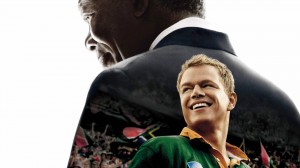INVICTUS: 3 STARS
After watching “Invictus” I’d vote for Morgan Freeman. He plays Nelson Mandela with an impressive mix of gravitas, intelligence and humanity, perfect for a mayor or even higher office, but just because I’d give him my vote doesn’t mean he’s made a good movie.
“Invictus,” Clint Eastwood’s thirty-first film as a director doesn’t feel as slap dash as “Gran Torino,” his exercise in first takes and weak performances from last year. It’s a more ambitious film, shot on location in South Africa, and featuring some flashy production design, but like his 2005 Oscar winner “Million Dollar Baby,” it is a human story set against a sports back drop. This isn’t a biography of Mandela or a study of race; it’s the story of the Springbok, a champion rugby team who became a unifying symbol of the new South Africa.
Freeman cuts an impressive figure as Mandela, capturing the man’s grace; unfortunately every line out of his mouth sounds like it should be engraved on an inspirational commemorative plate. It’s understandable to paint Mandela as a philosopher king, he is, after all one of the most impressive figures of our recent history, but according to “Invictus” he only speaks in platitudes. It doesn’t feel like a full portrait of the man, just an inspirational glimpse of a great man.
The other major character, Francois Pienaar (Matt Damon), captain of the Springboks, is similarly underdeveloped but made interesting by Damon’s performance. He’s becoming a great character actor who shows his versatility in roles as diverse as the bi-polar whistle blower in “The Informant” and the super spy character from the “Bourne” movies.
There is a good ninety minute movie hidden in the 133 minute running time. An underdeveloped subplot about Mandela’s strained relationship with his family doesn’t do much except slow the movie down and the important stuff—Mandela’s rise to power and the story of race reconciliation—is dispensed with in the sixty minutes, leaving us with over an hour to ramp up for the big game.
Despite drawing out the final game—it drags on for half an hour when a highlight reel would have sufficed—there are some very effective sequences. The bits of the film that work best are the small moments that don’t involve Mandela’s inspirational chestnuts. It’s strongest when the Springbok team go to the townships to teach the kids rugby or Pienaar sizes up Mandela’s old cell, using his arms to measure the width of the tiny enclosure. These are powerful moments and give the movie much of its oomph.
“Invictus” (it’s Latin for “invincible” and the title of an 1875 poem Mandela used as inspiration when things got rough during his 27 years in prison) takes a real story and filters it through a typical sports movie set up—the World Cup game in South Africa is a microcosm of the larger issues of acceptance—but misses most of the true drama inherent in the story.

